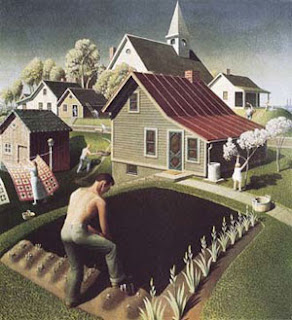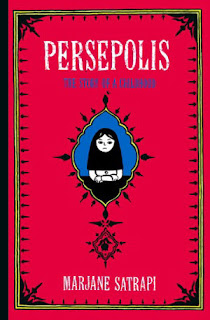"American Gothic"
by Iowa artist Grant Wood
If you live away from where you grew up, have you ever received an invitation to talk about "your people," those that raised you and the culture you grew up in? I can't say I had before. But one of the pleasures of living in Istanbul and having so many expat friends is that I interact with a variety of international people everyday.
My Internations travel group, the Travel Junkies (who I will write more about in future posts), began hosting evenings where individual members shared about the place they came from. The woman who spoke immediately before me spoke about her homeland of Iran. I joked it was just a little intimidating to follow an 8,000-year-old culture to tell about my home state of Iowa, which became a state a mere 166 years ago!
Repeat three times please: Iowa = corn!
The first things I wanted to teach my friends was to never mix up Iowa, Idaho, and Ohio ever again. Americans always confuse the three and ask Iowans about potatoes and Idahoans about corn.
The President of Iowa State University
at the National Archives in Washington D.C.
celebrating the 150th anniversary of the Morrill Act.
The Morrill Act gave every state in America
that wanted to participate
30,000 acres of federal land to use for a university to
uplift the population.
My hometown of Ames, Iowa, was the first
place in the nation to accept this land grant.
The result today: Iowa State University,
one of the world's most successful
agriculture and technical research universities
in the world supported by a mere 3,000,000 Iowans!
I then was deeply proud to share about Iowa's educational legacy. One of the best things I've ever read on just how good Iowa public education was in Tom Wolfe's book "Hooking Up," a series of essays about American culture. In it he wrote an inspiring essay detailing the impact Iowa public education had on Robert Noyce, a founding chairman of Intel, and a man frequently described as "the father of Silicon Valley."
Besides describing Noyce's educational experiences growing up in Iowa and at Grinnell College in Grinnell, Iowa specifically, Tom Wolfe made the case that the business casual dress popularized the IT industry was just Noyce's Midwestern lack of fashion pretense institutionalized into Silicon Valley culture.
I love that story, as one would never imagine Iowans having an impact on fashion. We are not a fashion forward people. But we are a deeply democratic people. There is no "us and them" in Iowa, when I grew up there, we viewed ourselves as "us."
Iowa has the highest per capita number of high school graduates of any state in the nation (as well it should since it was the first state in the nation to insitutionalize high school), the highest literacy rate of any state in the nation, we have two cities out of the top three with the most number of PhDs per capita (
Ames, Iowa and
Iowa City, Iowa share that distinction with Boulder, Colorado).
The beautiful law library
at the Iowa State Capitol building -
frequently used as a television backdrop
for Iowa caucus reporting by national news organizations
Indeed, literacy is so darn important in Iowa, that our recent first lady,
Christie Vilsack, visited every single public library in the State because she considered public libraries the most important provider of culture in each town. Some of those libraries were probably one room! She still visited them because those libraries brought their citizens the greater outside world.
After all, the University of Iowa (where I received my M.A. in Library and Information Science) is home to the
Iowa Writer's Workshop, the very first creative writing program in the nation. It draws not only nationally-famous writers, but internationally-known writers. For example, Orhan Pamuk, Turkey's Nobel laureate for literature, has spent time at the Iowa Writer's Workshop. UNESCO speculated
Iowa City may be the most literary spot in the world for its size. It has a mere 67,000 people and was recognized with those large world-famous cities!
"Spring in Town"
painted by Iowa artist
Grant Wood, 1941
In addition to our educational values, I thought our next most important deeply-held value was in feeding the world. Iowa is first in the nation in corn production, first in the nation in soybean production, 1st in the nation in hog production (the most searched for recipe on the Internet in America is for pork chops) 1st in the nation in egg production, and 2nd in the nation in beef production. Indeed, 90% of all Iowa's land is used in farming which resulted in Iowa contributing $4.5 billion in exports to help America's balance of trade in 2005.
Notice the precise geometry
of Iowa farming.
It's a sublter beauty than mountains and oceans,
but it is beauty, nonetheless.
My friends were fascinated by the combination of a highly agricultural state combined with a high level of education in the general population. Most Iowans live in cities. It's hard for folks who come from countries where agriculture is all about peasant traditions to imagine a place where high education levels and ag can be combined.
 |
| Dr. Borlaug |
Iowans care about feeding the world so much there is now a prize coming out of Iowa started by one of our own,
Dr. Norman Borlaug, the ag scientist who is credited with saving more human life than anyone else who has ever lived in the history of the world. Coming from a small farm in Cresco, Iowa, born of Norwegian heritage, Dr. Borlag helped farmers globally increase their yields. He won the Nobel Peace Prize for his efforts.
The Iowa-generated
World Food Prize is a mere 22 years old, but hopes to be recognized as the "Nobel Prize of Food," honoring those innovators in politics and science who find new ways to feed humanity. The Secretary of State announces the winner every year and the Secretary General of the United Nations comes to the awards ceremony each year. I hope, gentle reader, that you will care as much about who wins this award, as any other. I think it is that important, don't you?
A talk about Iowa wouldn't be complete without an explanation of the whole
Iowa presidential primary caucus system. I think Iowa maintains its first in the nation status for selecting the president through a
primary caucus for a very important reason. The first place to get a crack at judging future presidents should not only be highly educated but small enough for retail politics. Iowa is both. Candidates have to interact personally with Iowans, instead of selling themselves in paid media campaigns.
There is even a joke about it. A presidential candidate asks an Iowan for his vote in the upcoming caucus and the Iowan says, "I can't vote for you yet. I've only interacted with you three times." When I was a county chair for Bob Dole when he was running for President, it was fun to host Elizabeth Dole in my mom's living room where she preceded to tell us why Bob would make a great President.
Iowa (97% white), literally made Obama a star, when in 2008, chose him above everyone else as the winner of the Democratic caucus.
He finished his 2012 campaign in Iowa too, combining sentimentality and swing-state saavy.
I described three Iowa companies I thought would impact the entire world culturally:
Pioneer Hybrid for genetically-modified foods,
Pinterest, a social media company for sharing visual media, and
Dwolla, a brand new financial services company that makes money transfers inexpensive between people and companies.
The Iowa butter cow,
and her current sculptor, Sarah Pratt
Since my friends were travel junkies, I wanted to make sure they knew the four most important tourist things to do in Iowa. First is riding on
RAGBRAI, the 10,000-strong annual bike ride across Iowa that occurs every July. The second is driving the
Iowa River Road along the Mississippi, what National Geographic Magazine calls as on of the "500 Drives for a lifetime," third is spending a day at the
Iowa State Fair with a special look at the sculpted "butter cow," and my last suggestion was renting a houseboat to float down the Mississippi.
You don't have to be in Istanbul, or even an expat, to carry out this idea of rotating travelogues from natives to friends. I've loved attending each one (usually presented with a meal that matches the country) and so far I have learned about Trinidad and Tobago, Lebanon, Sudan, and Iran.





























 Who links to me?
Who links to me?
